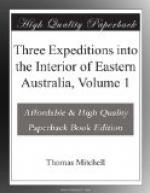And bade the lovely scenes at distance hail.
But this was not the song of hope, but of despair, at least so it sounded to me under the circumstances, and so it really proved to be, as I afterwards ascertained.
Men’s voices were also heard, as we proceeded quietly to our old ground, and I could not help regretting that after having given the natives on the Gwydir the slip, and seen no others the whole day, we should again find the very spot on which we were to pass the night, pre-occupied by natives. Our party set up their tents, and the song ceased, but I proceeded with Mr. White towards the place whence the voices came. We there saw several persons amid smoke, and apparently regardless of our presence; indeed, their apathy, as compared with the active vigilance of the natives in general, was surprising. A young man continued to beat out a skin against a tree without caring to look at us, and as they made no advance we did not go up to them. Mr. White, on visiting their fires however at ten P.M. found that they had decamped.
All this seemed rather mysterious until the nature of the song I had heard was explained to me afterwards at Sydney by The Bushranger when I visited him in the hulk on my return. He then imitated the notes, and informed me that they were sung by females when mourning for the dead; and he added that on such occasions it was usual for the relatives of the deceased to seem inattentive or insensible to whatever people might be doing around them.*
(Footnote. This custom is not peculiar to Australia, it prevailed also in the East:
“A melancholy choir attend around,
With plaintive sighs, and music’s solemn sound:
Alternately they sing, alternate flow
The obedient tears, melodious in their woe.”
Pope’s Iliad, Book 24 verse
900.
The note here is: “This was a custom generally received, and which passed from the Hebrews to the Greeks, Romans, and Asiatics. There were weepers by profession, of both sexes, who sung doleful tunes round the dead.” Harmer Volume 3 page 31.
It is admitted by all that this last practice obtained, and the following passages are proofs of it. Jeremiah 9:17, 18. “Call for the mourning women that they may come, and let them make haste, and take up a wailing for us, that our eyes may run down with tears, and our eyelids gush out with waters.” Idem. pages 33 to 36.)
At the time however this behaviour of the natives only made us more on our guard, and impressed the men with a sense of the necessity for vigilance, especially during the night when a watch was set on the cattle, and two men guarded the camp, while all the rest slept with their arms at hand.
This day two of the dogs fell behind, and as the whole were miserably poor we at first supposed that these had died from exhaustion; but as the weaker of the two came up to us in the evening it appeared then more probable that the dogs had been detained by the natives, who might be following our track, and that this one had escaped from them.




